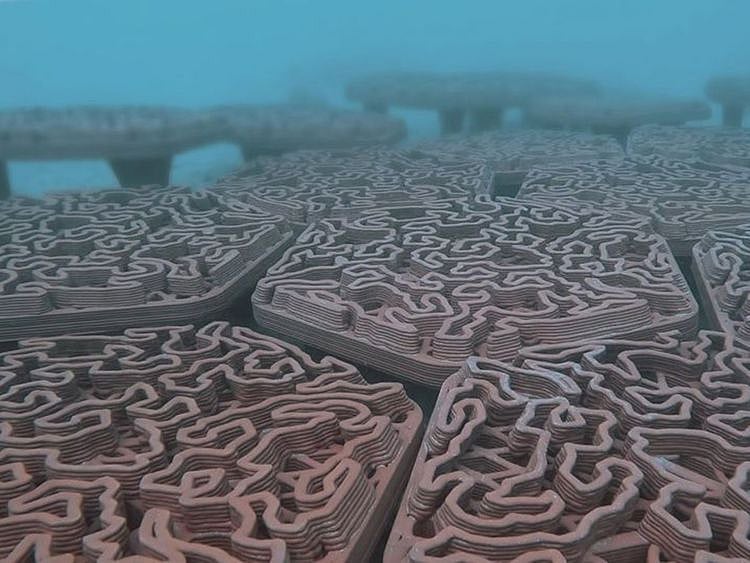Watch: How custom-made tiles will restore coral reefs in Abu Dhabi waters
Marine experts, architects, 3D printing specialists join forces to create novel solution

Abu Dhabi: Abu Dhabi has deployed a series of specially designed, 3D-printed terracotta tiles to restore coral reefs off the shore of the emirate.
The tiles were designed by a team of marine biologists and architects for ADQ, and Abu Dhabi-based investment and holding company and Abu Dhabi’s environment regulator, the Environment Agency – Abu Dhabi. They were produced through custom 3D clay printing by climate technology company Archireef.
Archireef, which is headquartered in Hong Kong, printed the tiles in Abu Dhabi’s KEZAD economic zone. In contrast to other types of artificial reefs, the clay-based reef structures are environmentally friendly, and engineered to closely mimic the natural pattern of corals. They also prevent sedimentation build up, which is a major threat for corals.
Funding innovation
The partnership between ADQ and Archireef, announced in November 2022, funds research and development of eco-engineering solutions for marine biodiversity restoration, and combines scientific research with the use of latest technologies in 3D printing, IoT (Internet of Things), and artificial intelligence (AI). Through its partnership with Archireef, ADQ aims to capture opportunities in innovative areas that simultaneously benefit the environment, mitigate climate change-related risks, and contribute to the preservation of habitats and species under the umbrella of its wider ESG aspirations.
The project is an innovative addition to the efforts of EAD, whose marine ecosystem preservation and rehabilitation initiatives are ranked among the top 10 global initiatives by the United Nations Environment Programme. The agency provided the project with logistical support and expertise, and the team of coral experts from EAD worked closely with ADQ and Archireef on assessing and selecting the site, providing corals to the project from EAD’s in situ coral nursery.
Project site
The outplantation site, selected in partnership with EAD, is a marine protected area near Um Khorah Island in Al Dhafra Region in Abu Dhabi. It features 40 square metres of reef tiles, housing around 1,200 coral fragments grown in specialised nurseries owned by EAD.
A team of seven scuba divers deployed the tiled over a five-day period. Continuous monitoring of the site will now help gather data on the performance of the corals, including photographic updates to capture the recruitment of fish populations.
Reef threats
As the most diverse ecosystems on Earth supporting the largest number of aquatic species per unit area, coral reefs increasingly enjoy special protection from governments and engaged private sector players. Abu Dhabi waters are known to house 34 different types of hard coral. Around the world, coral presence has declined over the past decade. Abu Dhabi is no exception - in 2017 alone, the emirate lost 73 per cent of its reefs due to mass coral bleaching, caused by an increase in water temperature.
Following this, the EAD launched the region’s largest coral reef rehabilitation project, with the aim of culturing 1 million coral reef colonies in Abu Dhabi waters.
Also Read
UAE wildlife, marine ecosystem to benefit from Dh440,000 conservation fundUAE: 4,000 coral polyps planted off Fujairah coast to regenerate marine ecosystemSustainable development
Anas Jawdat Albarguthi, chief operating officer at ADQ, said: “Our partnership with Archireef brings a unique and innovative coral restoration method to Abu Dhabi to safeguard our emirate’s natural environment and promote sustainable development. It is a memorable moment for ADQ to be part of this project providing a lifeline to endangered coral reefs, which is the first of its kind in the UAE and the wider region. Underlining our commitment to adopt practical solutions powered by R&D [research and development] and innovation to address environmental challenges, this biodiversity restoration initiative aligns with our ESG aspirations, and we believe it will have a positive impact not only on our planet but also on local communities we operate in.”
Public private partnership
Ahmed Al Hashemi, executive director for terrestrial and marine biodiversity sector at the EAD, said: “This project highlights the importance of embracing the use of innovative technologies to assist in the restoration of marine biodiversity. Partnerships between the private and government sectors are key to ensuring the protection of vulnerable habitats and research into species such as coral reefs. This specific project is an extension of all our marine restoration initiatives and our region’s first coral reef restoration project in particular. Furthermore, it is part of our efforts towards climate change adaptation and mitigation which is a priority for us at EAD, especially with the UAE hosting COP28 this year.”
Vriko Yu, co-founder and chief executive officer at Archireef said: “With reference to the industry-leading coral survivorship levels of 95 per cent which we accomplished in a comparable project in Hong Kong, there is good reason to believe that the Abu Dhabi marine ecosystem will derive similar benefits from the deployment of our innovative terracotta-based reef tiles. As the emirate ramps up climate change mitigation efforts in line with national objectives and targets, we hope to make a contribution to biodiversity restoration. From a biological perspective, our tiles offer corals the critically important foundation to settle on, which is the basis for rebuilding and rebalancing the fragile marine ecosystem.”
Sign up for the Daily Briefing
Get the latest news and updates straight to your inbox
Network Links
GN StoreDownload our app
© Al Nisr Publishing LLC 2026. All rights reserved.